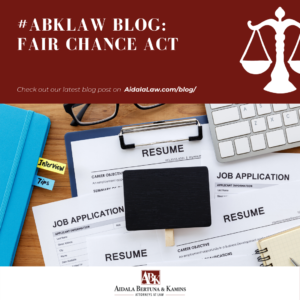12 Feb #ABKLaw Blog: Fair Chance Act
If somebody is gracious enough to give me a second chance, I won’t need a third. – Pete Rose
People make mistakes. Unfortunately, some mistakes result in criminal convictions. However, serving a sentence is only half the battle. Once an individual has repaid their debt to society, the next difficult step is to return to a normal life. Part of that return includes finding employment. Although a person is not their crime, often employers reject perfectly qualified candidates due to background check results even though that person has done everything asked of them.
To combat discrimination based upon past mistakes that result in a criminal conviction, the City of New York amended the New York City Human Rights laws to implement the “Fair Chance Act” in 2015. The Fair Chance Act, also commonly associated with “Ban the Box”, provides individuals with a criminal record a fair opportunity at employment. Specifically, the Fair Chance Act mandates a three-step hiring process in the Five Boroughs.
First, an employer must offer the position to the applicant before requesting that the applicant undergo an invasive background check. This removes any question that the reason for not hiring the applicant was because of his criminal record as, by offering employment, the applicant is deemed qualified for the position.
Second, should the applicant have a criminal record and the prospective employer chooses not to hire the applicant, the prospective employer must provide the results to the applicant as well as an explanation as to why the applicant is not suited for the position due to the criminal record. Specifically, the applicant must receive a statement that the prospective employer considered the following seven (7) factors:
“(a) The public policy of this state, as expressed in this act, to encourage the licensure and employment of persons previously convicted of one or more criminal offenses.
(b) The specific duties and responsibilities necessarily related to the license or employment sought or held by the person.
(c) The bearing, if any, the criminal offense or offenses for which the person was previously convicted will have on his fitness or ability to perform one or more such duties or responsibilities.
(d) The time which has elapsed since the occurrence of the criminal offense or offenses.
(e) The age of the person at the time of occurrence of the criminal offense or offenses.
(f) The seriousness of the offense or offenses.
(g) Any information produced by the person, or produced on his behalf, in regard to his rehabilitation and good conduct.
(h) The legitimate interest of the public agency or private employer in protecting property, and the safety and welfare of specific individuals or the general public.”
Further, the statement must state that, after considering these seven (7) factors, that applicant is no longer fit for the offered position.
These factors can result in a multitude of different determinations because they are very fact-specific. How much time must pass before the applicant is fit for the position? How serious is the offense? Does the job really relate to the criminal offense? Does the job really relate to the protection of property, safety, and welfare? How much does the public policy of this state weigh against the other factors?
More often than not, employers are either not properly trained to analyze these seven (7) factors or, worse, have discriminatory predispositions to individuals with a criminal record. As a result, applicants who would normally excel at a job and become a real asset to a company are rejected and, tragically, the road to returning to society becomes narrower. Individuals who have been discriminated against because of a criminal record often feel dejected and useless; that they will never be “normal” again. However, the Fair Chance Act, although not perfect, provides some protection to those individuals.
If you feel like your rights under the Fair Chance Act have been violated, it is important to speak with an attorney immediately. This office provides a free consultation to all individuals that feel as if they are being discriminated against because of their past decisions. A person is not their record.

#NewYorkLaw #NYLawFirm #CriminalDefense #CivilLitigation #Appellate #AttorneyDisciplinary #RealEstate #PersonalInjury #EmploymentLaw



